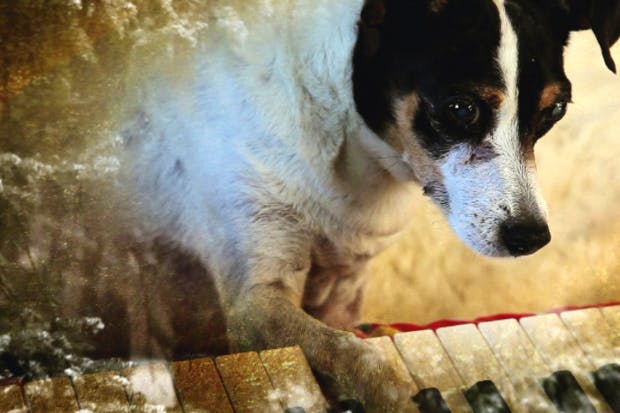Heart of a Dog is a film by Laurie Anderson and it’s a meditative, free-associating rumination on life, loss, love and dogs, with particular reference to her and her late husband’s (Lou Reed, who died in 2013) beloved rat terrier, Lolabelle (who died the same year).
It follows no linear logic. It’s a visual collage, a cine-poem, a dreamy documentary essay that was screened in London earlier this week to owners and their dogs — to rave reviews. ‘It’s great!’ said a golden retriever, but as he said the same of ‘a ball’ and also ‘a pizza crust’, he may not be the most reliable of critics. (This is why you never see golden retrievers on Film 2016 or writing for Sight & Sound.) For myself, I found it a bit weird, I grant you, but also wise and thought-provoking — ‘you should learn how to feel sad without being sad’; I’m still trying to work that one out — and strangely hypnotic.
Plus, it’s all done and dusted in an hour and 15 minutes which, as far as existential journeys go, is probably less time than it takes to get through to your bank or BT, in my experience.
Anderson, now 68, is the New York-based performance artist musician who had a hit in the Eighties with ‘O Superman’. This is her first film for 30 years — her earlier one was a behind-the-scenes documentary about life on the road — and it follows no formal demands or any linear rationale. It goes where it goes, drifts where it drifts, sniffs where it sniffs. It opens with a self-drawn animation of her ‘dream self’ giving birth to Lolabelle. A bit weird, I’ll grant you again, but it does enable you to feel the ferocity of her love for Lolabelle and, by association, for Lou to whom this film is dedicated, and who is only seen and heard fleetingly at the end, but whose absence feels like a constant presence gone.
The film then follows one thought as it leads to another, as accompanied by old footage, new footage, photographs, further animations, floating text, childhood cine films. Meanwhile, Anderson narrates throughout in a hushed, intimate tone with a particular phrasing that puts full stops where you least expect them, as in ‘What is the last thing you say. Before you. Turn into dirt?’ (In her mother’s instance, it was, ‘Why are there so many animals on the ceiling now?’)
As she sniffs around she reflects on memory, Buddhism, her own childhood, surveillance, the limits of language, 9/11, and the changes that happened in its wake. She takes Lolabelle up into the California mountains where a hawk swoops down, claws out, but then swoops away, having realised that Lolabelle is too big to grab by the neck. ‘I saw the look on Lolabelle’s face and I saw the realisation she was prey and these birds had come to kill her and they could come through the air …and then I realised it was the same look of my neighbours in New York. When they realised they could. Come through the air.’
Her starting point is always a personal anecdote, but any self-seriousness, pomposity or affectation is mostly cut with a salty, touching humour, as when she explains how Lolabelle came to them from a couple who were divorcing, ‘and no one would take her. The woman didn’t want her and the husband didn’t want her and their boy wanted her but no one. Really wanted the boy.’
She is interested in everything but most interested, I would suggest, in how we process mortality — ours and that of others —and how to be old. Lolabelle gets old and Lolabelle goes blind and keyboards are laid out on the floor so she can bash them with her paws, and enjoy the sounds. Just do what you can still do, is what you’ll take away, and when Lolabelle dies, it’s absolutely heartbreaking, but saved from Marley and Me sentimentality by Anderson’s honesty and relentless curiosity. Where has Lolabelle gone to? Will Lolabelle remain in her life, having taught her ‘a tenderness I didn’t know I had’?
This isn’t a cinematic film. You could happily watch it on BBC4, say, without missing anything, and it’s probably likely to please critics more than audiences. Critics have to sit though an awful lot of formulaic rubbish, and see off many superheroes, so are always delighted when a film comes along that seems true to its own self and different. I found it hypnotic, as I’ve said, and was happy to go with it as it sniffed around and went after this scent, then that one. So, maybe the golden retriever was right after all.
Got something to add? Join the discussion and comment below.
Get 10 issues for just $10
Subscribe to The Spectator Australia today for the next 10 magazine issues, plus full online access, for just $10.














Comments
Don't miss out
Join the conversation with other Spectator Australia readers. Subscribe to leave a comment.
SUBSCRIBEAlready a subscriber? Log in